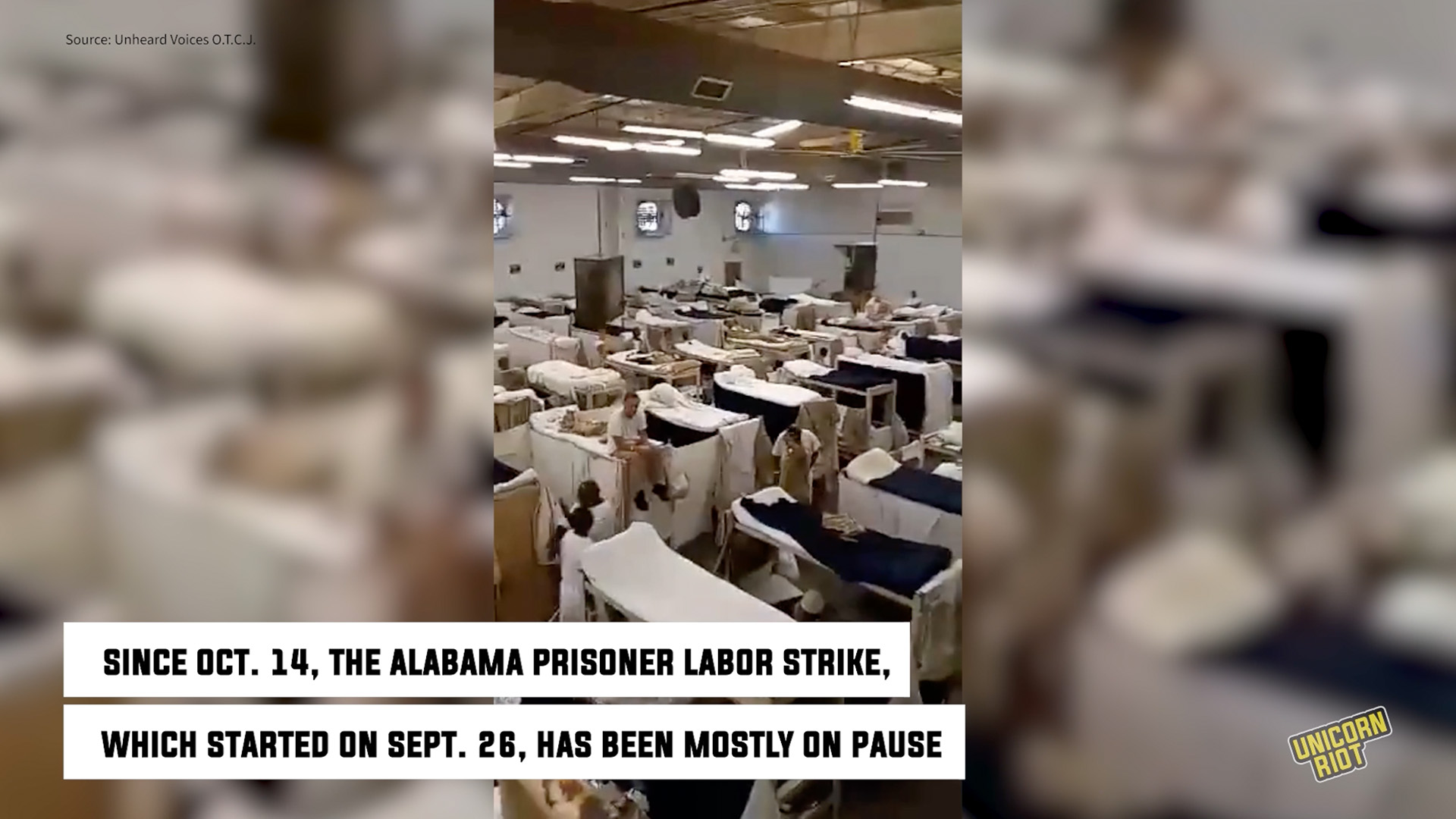Alabama Prison Strike on Hold After 3 Weeks
Alabama – Prisoners in Alabama announced on Oct. 14 that they had paused their historic three-week work stoppage. The strike, which started Sept. 26, involved thousands of prisoners throughout the state, causing the breakdown of normal operations at most major male prisons this month.
According to organizers, the strike’s end was announced following a protest at the state capitol in Montgomery hosted by Both Sides of the Wall. Diyawn Caldwell, founder of the prisoner advocacy group, explained that the strike may only be on pause, depending upon the government’s response.
“It’s been a collective effort from us on the outside and those on the inside that are organizing the strike to put it on hold to give the state, the governor, and the department of corrections time to address our grievances and concerns surrounding our demands,” said Caldwell. “If those grievances have not been addressed within an appropriate amount of time, we will resume the strike.”
Unicorn Riot interviewed Diyawn Caldwell and Christina Horvat, who is also with Both Sides of the Wall. They provided an intimate and in-depth look into the Alabama prison system:
On Oct. 18, the Alabama Department of Corrections (ADOC) confirmed that the prison work strike was over.
Strikers decided to put their protest on hold, in part, due to the impact that reduced caloric intake was having on prisoners with medical issues such as diabetes. During the strike, the ADOC reduced meal portions dramatically, feeding prisoners about 1000 calories or less per day.
“Our brothers, particularly those with health conditions, addiction and mental health challenges, have faced challenges not only to their psychological well-being but also their very lives,” strikers wrote in a public statement. “Especially alarming is ADOC’S intentional ‘bird feeding’ food [deprivation], which presents a severe health risk to those who suffer from diabetes and other illnesses that require a wellness diet.”
“Unlike the ADOC,” they wrote, “we value life.”
Hear directly from prisoners Swift Justice, Logical Solutions, and Kinetik Justice about why they were striking here.
The Alabama Department of Corrections admitted at the beginning of the strike that their reliance on free prisoner labor meant that the strike had severely disrupted their ability to run their facilities.
In response to the reduction in food portions, attorneys representing more than 35 Alabama prisoners filed a motion in federal court on Oct. 7 requesting that a federal judge grant immediate injunctive relief to the strikers. The motion, which was filed in an ongoing federal lawsuit brought by the U.S. Department of Justice against the Alabama Department of Corrections, claimed that the effect on the prisoners of the “bird feeding” “has been injurious, and their medical and psychological conditions will continue to deteriorate as their bodies are affected by inadequate dietary and medical access.”
“Some Plaintiff-Intervenors have lost a dangerous amount of body mass,” the motion reads. Prisoners “have had blood sugar drop to dangerous levels, and have experienced other acute medical symptoms (e.g., nausea) as a direct result of Defendants’ decisions to reduce calories and meal frequency.”
Judge R. David Proctor has yet to rule on the motion, although the Department of Justice has filed a motion in court opposing the prisoners’ attempt to intervene in the case, claiming that taking on additional considerations at this time would slow down the progress of the overall case.
The inhumane conditions in Alabama prisons have been extensively documented, including in a 2019 Department of Justice report that found that the ADOC “does not reasonably protect prisoners from rampant violence” and sexual abuse, and that conditions in Alabama prisons “violate the Constitution.”
Alabama Governor Kay Ivey’s solution to the ongoing crisis within the Alabama prison system is to use coronavirus federal relief funds to build three new prisons in her state. Ivey’s plan involves using up to $400 million of American Rescue Plan coronavirus relief funds on prison projects, according to the Associated Press.
Prisoners and their advocates have pushed back against this plan, claiming that building more prisons is not the solution to mass incarceration in Alabama.
The recent federal court motion in defense of the striking prisoners echoed these criticisms: “The Defendants and their affiliates are using this litigation to justify enormous expenditures on physical infrastructure, much of which is undoubtedly in poor repair (and practically all of which is unairconditioned, moldy and dilapidated, making recruitment of correctional officers difficult, especially at relatively low levels of pay).”
“As a result, the money that Defendants would use to hire correctional officers (not to mention feed or medicate prisoners) is going or will go to build new prisons that may improve conditions in the distant future, rather than to ameliorate the cruel and unusual punishment immediately at hand.”
Motion for Leave to Intervene
Incarcerated prisoner rights activist Kinetik Justice told Unicorn Riot that during the first week of the labor strike, he was beaten by correctional officers and subsequently placed in solitary confinement:
When the strike was put on hold on October 14, strikers released a statement explaining why at least some prisoners were deciding to return to work. “Since the peaceful labor strike within the Alabama Department of Corrections began on September 26,” the statement reads. “Those who are striking have faced relentless attempts to break our spirit by the correctional staff.”
“We have been starved, placed into solitary confinement and suicide cells as retaliation, and forced into dangerous situations as ADOC tries to turn us against each other…The world is watching.”
Striking prisoners’ statement on Oct. 14
Organizers with Both Sides of the Wall say that the struggle is far from over. “We’re going to continue to fight,” said Caldwell. “It’s going to take the death of me if that’s what they’re looking for. We’ll fight tooth and nail.”
Follow us on X (aka Twitter), Facebook, YouTube, Vimeo, Instagram, Mastodon, Threads, BlueSky and Patreon.
Please consider a tax-deductible donation to help sustain our horizontally-organized, non-profit media organization:



